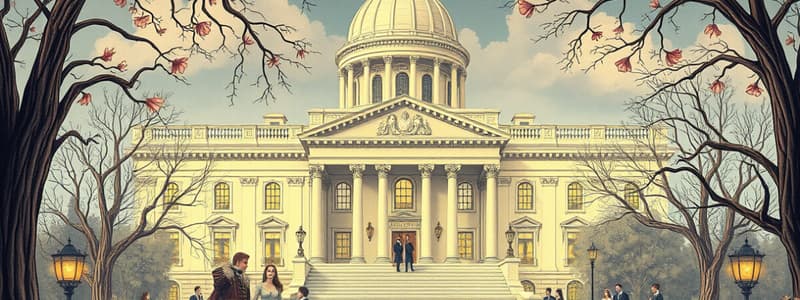Podcast
Questions and Answers
What does limited government mean?
What does limited government mean?
- Government has complete control over citizens
- Government has no authority
- Government is restricted in what it may do (correct)
- Government can take away individual rights
What serves the will of the people?
What serves the will of the people?
Representative government
What is the Magna Carta?
What is the Magna Carta?
The Great Charter
Who signed the Petition of Right?
Who signed the Petition of Right?
Who signed the English Bill of Rights?
Who signed the English Bill of Rights?
What is a charter?
What is a charter?
What does bicameral refer to?
What does bicameral refer to?
What does proprietary mean in government context?
What does proprietary mean in government context?
What is popular sovereignty?
What is popular sovereignty?
What was the Boston Massacre?
What was the Boston Massacre?
What was the Declaration of Independence?
What was the Declaration of Independence?
What were the Articles of Confederation?
What were the Articles of Confederation?
What is ratification?
What is ratification?
Who is referred to as the 'Father of the Constitution'?
Who is referred to as the 'Father of the Constitution'?
What are the Bill of Rights?
What are the Bill of Rights?
Which state was the last key state for ratification of the Constitution?
Which state was the last key state for ratification of the Constitution?
Study Notes
Foundations of American Government
- Limited Government: Restricts government powers, safeguarding individual rights.
- Representative Government: Ensures the government reflects the people's will and involves them in its processes.
Historical Documents Influencing Government
- Magna Carta (1215): First document to limit king's authority, signed by King John.
- Petition of Right (1628): Signed by Charles I, emphasized that even monarchs must follow the law, challenging divine right.
- English Bill of Rights: Established by William and Mary, outlined fundamental human rights.
Colonial Governance Structures
- Charter: King’s written grant of authority to govern a territory.
- Bicameral Legislature: A two-house legislative system for governance.
- Proprietary Colony: Established and governed by a proprietor with significant autonomy.
- Royal Colony: Governed by officials appointed by the king (e.g., New Hampshire, Virginia).
Attempts at Unity and Representation
- New England Confederation: Early effort for colonial unity against Native American attacks.
- Albany Plan of Union: Proposed annual congress for colonial delegates by Benjamin Franklin, advocating for collective action.
Key Events Leading to Independence
- Popular Sovereignty: Concept that government’s power derives from the consent of the governed.
- Boston Massacre (1770): British troops killed civilians during protests, escalating tensions.
- Boston Tea Party: Protest led by Samuel Adams against the Tea Act, demonstrating colonial resistance.
- First Continental Congress: A reaction to the Intolerable Acts, advocating for trade boycotts against Britain.
- Second Continental Congress: Established as the first national government during the revolutionary struggle.
Foundations of Independence
- Declaration of Independence: Document declaring American intent to separate from Britain.
- Articles of Confederation: Created a loose alliance among states, preserving state sovereignty.
Constitutional Framework
- Ratification: Process of formal approval necessary for the Constitution’s adoption.
- Framers: Delegates at the Philadelphia Convention who created the Constitution.
- Virginia Plan: Proposed a strong central government, with representation based on population.
- New Jersey Plan: Advocated for equal representation in a unicameral legislature.
Compromises and Agreements
- Connecticut Compromise: Established a bicameral legislature combining population-based and equal representation.
- Three-Fifths Compromise: Determined that enslaved individuals would be counted as three-fifths of a person for representation.
- Commerce and Slave Trade Compromise: Congress granted a 20-year moratorium on regulating the slave trade and taxing exports.
Political Groups and Their Views
- Federalists: Supporters of the Constitution, advocating for a strong central government.
- Anti-federalists: Opponents of the Constitution, fearing overreach of federal authority.
Key Figures
- James Madison: Known as the "Father of the Constitution" for his significant role in its drafting.
- Alexander Hamilton: A prominent Federalist who highlighted the weaknesses of the Articles of Confederation.
Bill of Rights
- Bill of Rights: Comprised the first ten amendments to the Constitution, guaranteeing essential rights and freedoms.
Conclusion of Ratification Process
- New York: The final critical state necessary for the Constitution's ratification, ensuring its establishment as the governing framework.
Studying That Suits You
Use AI to generate personalized quizzes and flashcards to suit your learning preferences.
Description
Explore the key concepts of limited government, representative government, and the significance of the Magna Carta in American political heritage. This quiz will help you understand the foundational principles that have shaped the U.S. government. Perfect for reviewing important terms and their definitions.




